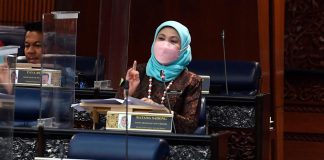KOTA KINABALU, Nov 18 — Savings from the termination of subsidies for chicken should be directed towards encouraging more research and development (R&D) in the country’s poultry farming industry, ultimately producing high-quality chicken.
Universiti Teknologi MARA (UiTM) Sabah lecturer at the Faculty of Business and Management, Herniza Roxanne Marcus believes that funds from the subsidies can be allocated to R&D to produce better and higher-quality chicken breeds.
In addition, she said this would be able to help small and medium-sized breeders increase their productivity and the quality of their production.
“In this way too, chicken supply for the domestic market could be increased thus reducing the country’s dependence on imported chicken to meet local demand,” she told Bernama.
On Oct 30, Agriculture and Food Security Minister Datuk Seri Mohamad Sabu said that the government had allocated a total of RM3.8 billion in subsidies to cover the costs of chicken and eggs since February 2022.
Herniza Roxanne said funds from the savings could also be used to enhance various socio-economic initiatives and the welfare of the people, especially in Sabah.
This includes assistance to small and medium-sized enterprises (SMEs), building schools, hospitals, clinics, and other essential facilities.
She said assistance to SME businesses would undoubtedly strengthen the industry as they could provide employment opportunities for the people, especially in Sabah.
“The government needs to plan carefully to ensure that investments from these funds are fairly distributed to the people,” she said adding that there must also be a sufficient supply of chicken to prevent chicken prices from soaring, especially during festive seasons.
The floated chicken prices must be monitored to ensure a win-win situation in the chicken production chain so that consumers are not burdened by fluctuating prices and there is no exploitation by any party, she added.
Meanwhile, Consumers Front of Sabah (CFOS) president Nordin Thani, believes it is time for the government to introduce specific programmes or incentives to establish chicken farming among small farmers or local communities through existing cooperatives.
He said this could be realised through funds from the chicken subsidies, emphasising that training and education in poultry farming especially, should be more widely introduced since there are vast and underutilised land in the country.
This is important because the termination of subsidies for chicken would not necessarily boost the chicken farming sector as the costs associated with chicken farm production and maintenance are still high.
“This is due to several factors, including difficulties in obtaining land for lease, financial assistance or loans from financial institutions, and unclear information on programmes and incentives for chicken farmers who want to venture into the field.
“As such, various measures and preparations should be made to restore the balance between the demand and production of local eggs and chickens to ensure a constant supply to meet consumer demand,” he said.



















